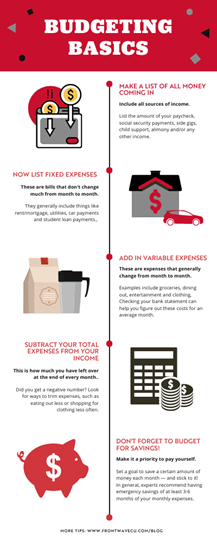
Budgeting Basics
- 11.5.2020
- Financial Education
- Adapted from GreenPath Financial Wellness
As we enter the final months of the year, now’s a good time to take a look at your financial wellness and consider any changes to financial habits you might like to make in 2021. One of the most important and fundamental habits for financial wellness is budgeting. By making budgeting a habit now, you will see lots of benefits over the long-run!
What is a Budget?
A budget is a plan for how much money comes in and how much money goes out each month. It’s really that simple. By breaking down your budget into categories such as mortgage, food, and entertainment, you can see where you can cut back, and where you have wiggle room. Creating a budget that factors in things like savings and investments also makes it easier for you to create a solid foundation.
Why Budget?
Budgeting will give you clarity into your finances and will help you make more informed choices. You wouldn’t enter a dark room without turning on the lights first, right? That’s exactly what a budget is for your finances: it’s a light that you shine on your financial transactions. By seeing your finances clearly, you may notice where you are overspending. You can set other goals too, such as paying down debt, saving, and investing. By placing these items on your budget, you are essentially making your financial goals a bill that you pay to yourself. This makes it easier for you to achieve your dreams on your journey of financial wellness.
Who Should Budget?
A budget is beneficial for anyone who uses one. Almost every business in the United States operates off of a budget, which allows them to make smart financial choices to increase the bottom line. Families who create a budget also find that they are better positioned to achieve financial wellness and meet certain goals like planning for retirement or building up a college fund. For individuals, the benefits are the same: greater understanding of your finances that enables better choices for how you spend your money.
How do I Budget?
The first step to creating a budget is to list all the money that you have coming in. This includes your paycheck, social security payments, alimony, money from a side gig, or any other form of income you receive. Next, track your spending. Here you want to start with all of your fixed payments — the bills you absolutely have to pay such as mortgage, utilities, car payments, student loan debt, etc. After that, take a look at your last few bank statements and figure out where the rest of your money is going. Record all of your income and expenses in a place that is easy to access and understand. There are online tools, such as Mint.com, that can automate the budgeting process for you.
When Should I Budget?
You can create a budget anytime! The important thing is to stay consistent and continue to track it. For instance, when you first start budgeting, you’ll want to make sure you are sticking to your budget each month. This will ensure that budgeting becomes a habit and will help you make sure you are staying on track with your financial goals. Once you get into the flow of budgeting, you may decide to refresh your budget seasonally. Updating your budget on a semi-regular basis allows for you to account for changes in income or expenses, such as a raise or unexpected medical issues.
Some people think of a budget as the financial equivalent of a straitjacket, but the reality is just the opposite. Rather than constricting you, a budget gives you freedom to spend, knowing that you are able to achieve your financial goals at the same time. Once you know your budget and stick to it, you’ll find a sense of mental clarity on your path to financial wellness.






